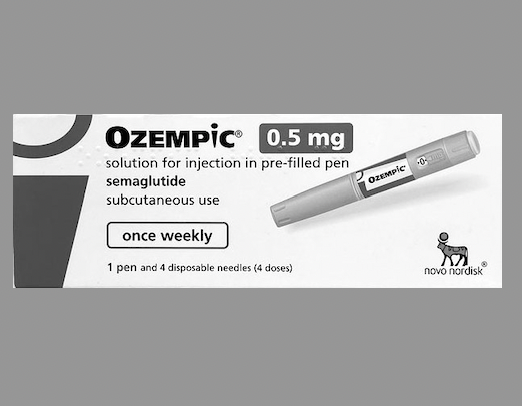This article was originally written for the print edition in April, 2024. Apologies for any inaccuracies stemming from a lack of updates.
Charles Dickens, “A Tale of Two Cities”: “It was the best of times, it was the worst of times, it was the age of wisdom, it was the age of foolishness, it was the epoch of belief, it was the epoch of incredulity, it was the season of Light, it was the season of Darkness, it was the spring of hope, it was the winter of despair.”
It was probably also the season of using non-insulin semaglutidic medications as a work-all-do-all-always weight loss panacea and then being an A-list celebrity who denies the medication’s existence, owing all to overpriced green juices and pilates. For this celebrity, it might be time to fret: the TikTok users are already on the “Ozempic face” analysis.
Semaglutide is a modified GLP-1 peptide used primarily to treat type 2 diabetes and in some cases, used for long-term weight management in those suffering from obesity. Since its Federal Drug Administration approval in 2017, the drug has been sold under the names Rybelus, Wegovy, and most infamously, Ozempic.
According to Google search trends, searches for the word Ozempic began to uptick in 2022, peaking for the first time at a worldwide search “popularity rating” of 85 in June of 2023 before taking a small decline – by only 21 points. As of April 2024, Ozempic sits at a rating of 99. It has held that same rating for two months straight.
It’s not just people searching Ozempic. People are buying it in masses; the pharmaceutical companies that produce it and their semaglutide counterparts have invested billions of dollars to keep up with ever-rising production demand. And this isn’t stemming from a sudden uptick in diagnoses of type 2 diabetes. The majority of new users find the drug’s appeal in its weight-loss capabilities, but not because they medically classify as obese, rather because it’s hot and it’s a new trend and it gets you skinny and it works and all of the celebrities who have been hopelessly promoting Weight Watchers for the past two decades (e.g., Oprah) have finally abdicated their false GetThinQuick! thrones. As always, there are those who do and those who don’t, but not in the sense of volunteer work or in the sense of using the drug or not; rather, in the eyes of the opposition, there are those who should probably be using Ozempic, considering they are diabetic or medically obese – and those who maybe shouldn’t be using Ozempic: people who maybe do struggle with weight but who aren’t struggling significantly enough to warrant the use of a semaglutide (a serious drug with serious side effects) and people who are of a medically healthy weight – both groups of which intention can point to body-image related issues.
From there, the big critic’s question arises: Is prescribing Ozempic to “those who shouldn’t” okay? One side argues that it can help confidence and self-worth; they bring up the point that the medication is FDA-approved and so should be helpful to a client, even if on a different magnitude of need. The opposing side argues that this prescription enables unhealthy habits, promotes diet culture, and feeds into the idea that not conforming to a certain body type means that you are unhealthy and thus need medical intervention.
The answer to that question may be murky to someone weighing the arguments, but a typically indisputable ethical standing for doctors is that you should not prescribe unnecessary medication to a patient; and especially not when the medication is not completely safe. As more and more people use it, more and more people are facing unprecedented side effects: namely, worry is arising about “Ozempic babies.” Nearly nothing is known about the effects of semaglutides on pregnant people and studies on potential effects are still in progress. However, considering that Ozempic may cause people to experience malnourishment from a decline in food intake (especially if the user doesn’t technically qualify for the drug) and that semaglutide messes with hormones (with evidence that shows that it lessens the efficiency of birth control), doctors are advising patients to consider getting off the drug if they are actively seeking pregnancy or may be pregnant.
The issue remains of these same doctors still prescribing the unsafe medication and of it being promoted and normalized everywhere in the media – if someone’s favorite celebrity is using Ozempic, it must be safe and okay! (No! Probably not! Celebrities are not bastions of medical safety!)
On the topic of celebrities, the other day, Barbara Streisand commented under an Instagram post of Melissa McCarthy’s, asking her if she took Ozempic. When fans noticed the comment and began to express confusion over the comment being public, Streisand came up with the statement saying that she only wanted to pay her friend a compliment. Responses were mixed: some people were appalled that that was a compliment while others defended it, with one commenter writing “Everyone is on Ozempic, nothing to worry.” It does in fact seem like everyone in Hollywood is on Ozempic, so much so that TikTok users, rather than guessing those who use the drug, have turned to applauding those who avoid using the drug. With this applause also comes shame to people for using it. Recently, in a diss track about Drake, Kendrick Lamar, speaking to Drake’s son rapped the lyric, “Don’t cut them corners like your daddy did, [****] what Ozempic did.” This sentiment holds true for many critics of the drug; some people are now feeling cheated for working towards their weight loss journeys, dubbing Ozempic an easy way out.
So what Ozempic is, besides a semaglutide, remains unclear. To some, it’s a life-saving drug; to others, it’s simply life-altering, a magical shortcut on what can sometimes be a grueling weight loss journey; to others, it’s a way to fit in further with the status quo and a status symbol; to others, it’s an unfair advantage; to others, it is a dangerous drug of which the abuse must be stopped. On top of that, to pharmaceutical corporations, it’s a growing goldmine of medication.
But for now, not one specific group is really winning. While pharma companies profit, they also face scything incoming medical review and criticism. And while Ozempic’s popularity grows because of its lovers’ promotions, criticism against it grows at the same rate.
There is one group losing though: those who need the medication to live their lives but who are now experiencing a shortage. Ironically, that makes its misuse food for thought.





